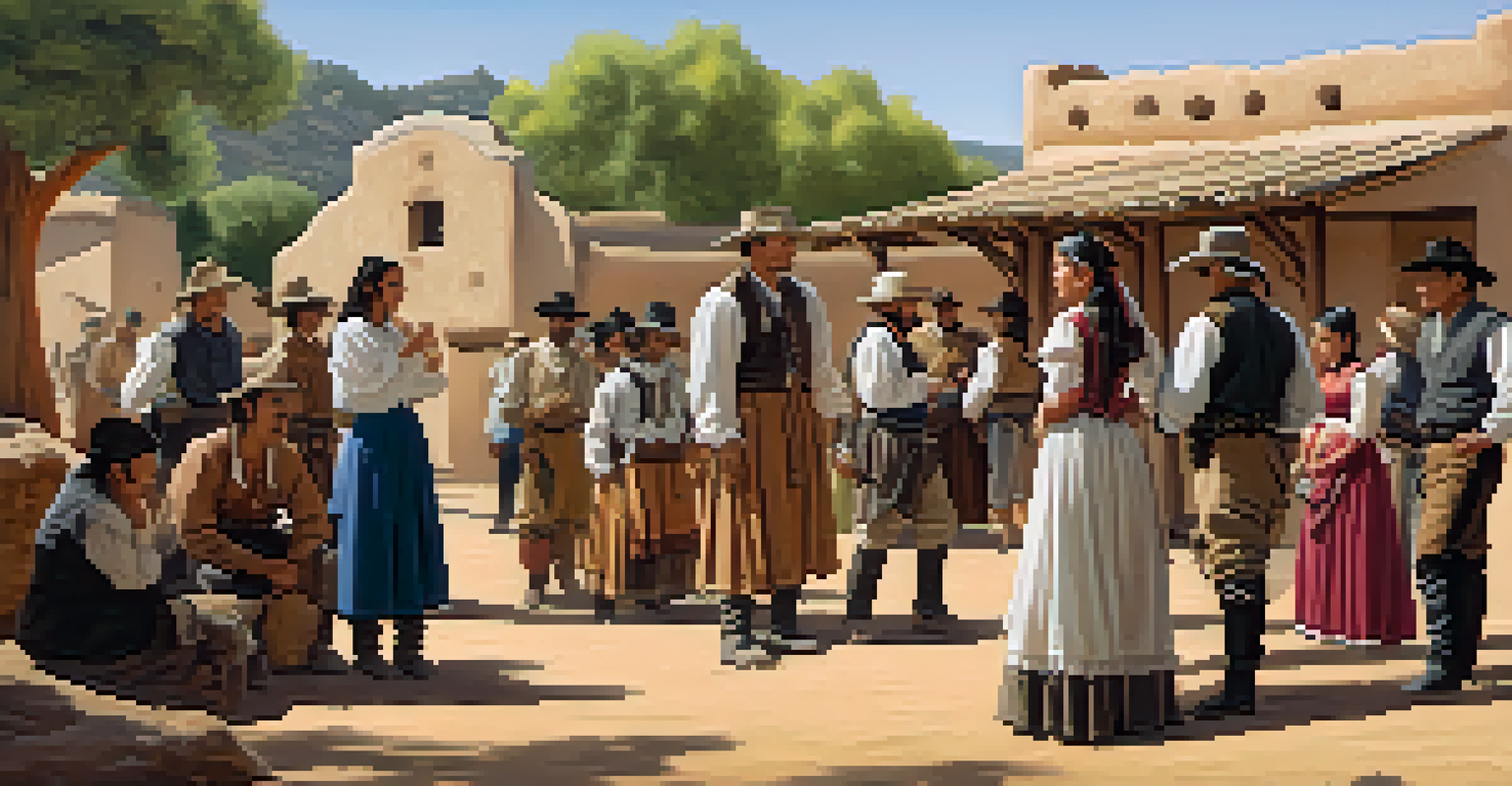California's Gold Rush: The Influence of John Sutter

Who Was John Sutter? A Pioneer in California
John Sutter was a Swiss immigrant who played a crucial role in early California history. Arriving in 1839, he established Sutter's Fort, a trading post that became a hub for settlers and travelers. His vision for a prosperous agricultural community attracted a diverse group of people seeking new opportunities.
The future belongs to those who believe in the beauty of their dreams.
Sutter's Fort served as a safe haven, supplying essential goods and services to those venturing westward. It quickly became a melting pot of cultures, reflecting the spirit of adventure that defined the era. This bustling center set the stage for the events that would soon unfold, forever changing California's landscape.
Through hard work and innovation, Sutter transformed the region's economy, laying the groundwork for the Gold Rush. His efforts not only shaped the local community but also positioned him as a key figure in California's transformation from wilderness to settlement.
The Discovery of Gold: A Game Changer
The 1848 discovery of gold at Sutter's Mill, just a few miles from Sutter's Fort, was a turning point in American history. This monumental event ignited the Gold Rush, attracting hundreds of thousands of fortune seekers to California. Sutter, who initially sought to build a thriving agricultural empire, found himself at the center of a frenzy he hadn't anticipated.

As news of gold spread like wildfire, Sutter's once peaceful settlement transformed into a bustling camp of miners and adventurers. The influx of people brought both opportunities and challenges, as Sutter struggled to maintain order and manage resources. His dream of a prosperous community began to unravel under the weight of chaos and ambition.
John Sutter: Pioneer of California
John Sutter established Sutter's Fort, a vital trading post that became a cultural melting pot and a foundation for California's early settlement.
Despite the turmoil, the Gold Rush was pivotal in shaping California's identity and economy. This era of rapid change ultimately led to California's statehood in 1850, a testament to the profound impact of Sutter's fortuitous location and timing.
Sutter's Fort: The Heart of the Gold Rush
Sutter's Fort became synonymous with the Gold Rush, serving as a crucial staging area for gold seekers. As prospectors flocked to the region, the fort provided them with supplies, shelter, and a sense of community amidst the uncertainty. Its walls echoed with the stories of those who dared to dream of striking it rich.
Fortune favors the bold.
The fort evolved into a bustling marketplace, where miners could trade goods and share news. Sutter's foresight in establishing this hub allowed him to capitalize on the growing demand for supplies. However, the sheer volume of people also strained Sutter's resources, leading to conflicts and challenges.
As the Gold Rush progressed, Sutter's influence waned, but the legacy of Sutter's Fort remained. It became a symbol of the wild west and the dreams that fueled the migration to California, capturing the spirit of an era defined by ambition and adventure.
The Rise and Fall of John Sutter
While Sutter initially prospered from the Gold Rush, his fortunes took a dramatic turn. As miners flooded the area, they often disregarded Sutter's land rights, leading to conflicts and legal battles. Despite his attempts to protect his property, Sutter found himself increasingly overwhelmed by the chaos surrounding him.
By the early 1850s, Sutter's dreams of wealth and stability crumbled. He faced financial ruin as his agricultural enterprises faltered and the gold miners took over his land. This downfall serves as a poignant reminder of the unpredictable nature of fortune during this tumultuous period.
Gold Rush Transformed California
The discovery of gold at Sutter's Mill in 1848 sparked a massive influx of settlers, dramatically reshaping California's economy and identity.
Sutter's story is a testament to the highs and lows of the Gold Rush. While he played a significant role in its inception, the very forces he helped unleash ultimately led to his decline, illustrating the complex interplay between opportunity and adversity in the pursuit of the American Dream.
Cultural Impacts of the Gold Rush
The Gold Rush was more than just a quest for wealth; it significantly influenced California's cultural landscape. As people from diverse backgrounds converged on the region, they brought their traditions, languages, and beliefs. This melding of cultures laid the foundation for California's rich tapestry of diversity.
Sutter's Fort became a microcosm of this cultural exchange, where different communities interacted and shared ideas. The relationships formed during this time gave rise to unique customs and practices that still resonate today. The Gold Rush era fostered a spirit of resilience and innovation that defined California's future.
Moreover, the Gold Rush sparked important discussions about social equity and rights. As miners and settlers pushed westward, they often encountered Indigenous peoples, leading to complex and often tragic interactions. These dynamics set the stage for ongoing conversations about justice and representation in California's history.
The Legacy of John Sutter and the Gold Rush
John Sutter's legacy is multifaceted, encompassing both his contributions to California's development and the consequences of the Gold Rush. Today, Sutter is remembered as a pioneer whose vision helped shape the state. However, his story also serves as a cautionary tale about the unforeseen impacts of ambition and growth.
Sutter's Fort has been preserved as a historic site, drawing visitors who want to learn about this transformative period. It stands as a reminder of the dreams and struggles of those who came before us, reflecting the complex narrative of California's past. The Gold Rush's legacy is interwoven with Sutter's story, illustrating the interconnectedness of individuals and events.
Legacy of Ambition and Adversity
Sutter's story illustrates the unpredictable nature of fortune during the Gold Rush, highlighting the interplay between opportunity and the challenges it can bring.
Ultimately, the Gold Rush catalyzed California's transformation into a vibrant state known for its innovation and diversity. Sutter's role, while fraught with challenges, remains a significant chapter in this ongoing narrative, reminding us of the profound impact one individual can have on history.
Lessons Learned from the Gold Rush
The Gold Rush era offers valuable lessons about ambition, resilience, and the unpredictable nature of fortune. It highlights the importance of adaptability in the face of change, as individuals like Sutter navigated the tumultuous waters of opportunity and risk. The ability to embrace uncertainty can lead to unexpected outcomes, both positive and negative.
Furthermore, the Gold Rush underscores the significance of community and collaboration. As diverse groups came together in pursuit of a common goal, they forged connections that transcended cultural boundaries. This spirit of unity is a reminder that shared aspirations can lead to remarkable achievements.

Finally, the story of John Sutter and the Gold Rush invites reflection on the ongoing legacy of these historical events. As we consider the impacts of the past, we can better understand the complexities of progress and the need for inclusive narratives that honor all voices in our shared history.